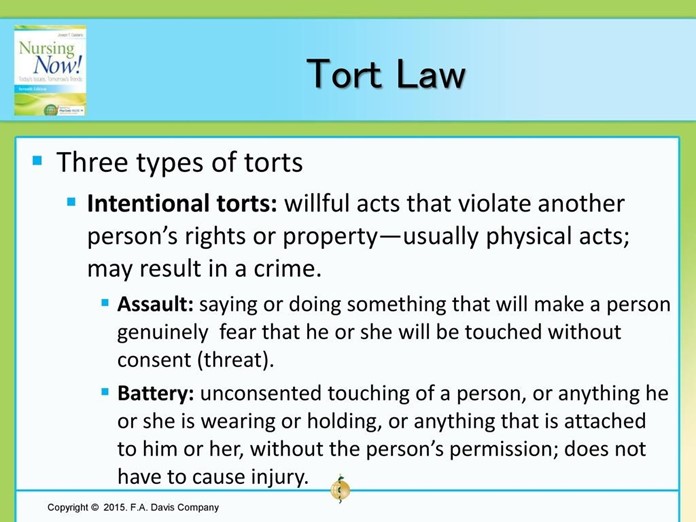Which situation can lead to a tort against a nurse? SELECT ALL THAT APPLY:
A stranger asks for details regarding a patient, and the nurse refers him to the patient or his family.
A patient refuses a blood transfusion on religious grounds.
In a staff meeting, a nurse repeats a rumor about a patient's personal life.
A nurse tells friends something unusual about a patient that she noted in the patient's chart.
A patient refuses medication, but the nurse forces her to take it for her own good.
Correct Answer : C,D,F
Situations that can lead to a tort against a nurse include repeating a rumor about a patient's personal life in a staff meeting, telling friends something unusual about a patient that was noted in the patient's chart, and forcing a patient to take medication against their will. These actions can result in legal action against the nurse for invasion of privacy or battery.
Option A is incorrect because referring a stranger to the patient or their family for details regarding the patient is an appropriate action.
Option B is incorrect because respecting a patient's right to refuse treatment on religious grounds is an appropriate action.
Option E is incorrect because placing an alarm on the bed of a patient prone to falling is an appropriate action to ensure their safety.

Nursing Test Bank
Naxlex Comprehensive Predictor Exams
Related Questions
Correct Answer is A
Explanation
If an assistive personnel (AP) refuses to take a specimen to the laboratory, the nurse should first discuss the incident with the AP. This allows the nurse to understand the reasons for the refusal and to address any concerns or issues that may have led to the refusal.
Option B may be necessary at some point, but it should not be the first response.
Option C may also be necessary to ensure that the specimen is delivered to the laboratory in a timely manner, but it does not address the underlying issue.
Option D may also be necessary at some point, but it should not be the first response.
Correct Answer is ["B","C","E"]
Explanation
Discussing clients at the table in the cafeteria [b], disposing of written report sheets into the facility trash receptacle [c], and sharing a personal password with a coworker [e] are all actions that jeopardize client confidentiality. Client information should be kept private and secure at all times. Discussing clients in public places or disposing of client information in an unsecured manner can result in unauthorized access to confidential information. Sharing personal passwords can also compromise the security of client information.
The other options do not jeopardize client confidentiality. Removing client information from fax machines immediately [a] helps to prevent unauthorized access to confidential information. Giving verbal reports at change of shift in a designated conference room [d] is a standard practice that allows for the secure transfer of client information between healthcare providers.
Whether you are a student looking to ace your exams or a practicing nurse seeking to enhance your expertise , our nursing education contents will empower you with the confidence and competence to make a difference in the lives of patients and become a respected leader in the healthcare field.
Visit Naxlex, invest in your future and unlock endless possibilities with our unparalleled nursing education contents today
Report Wrong Answer on the Current Question
Do you disagree with the answer? If yes, what is your expected answer? Explain.
Kindly be descriptive with the issue you are facing.
